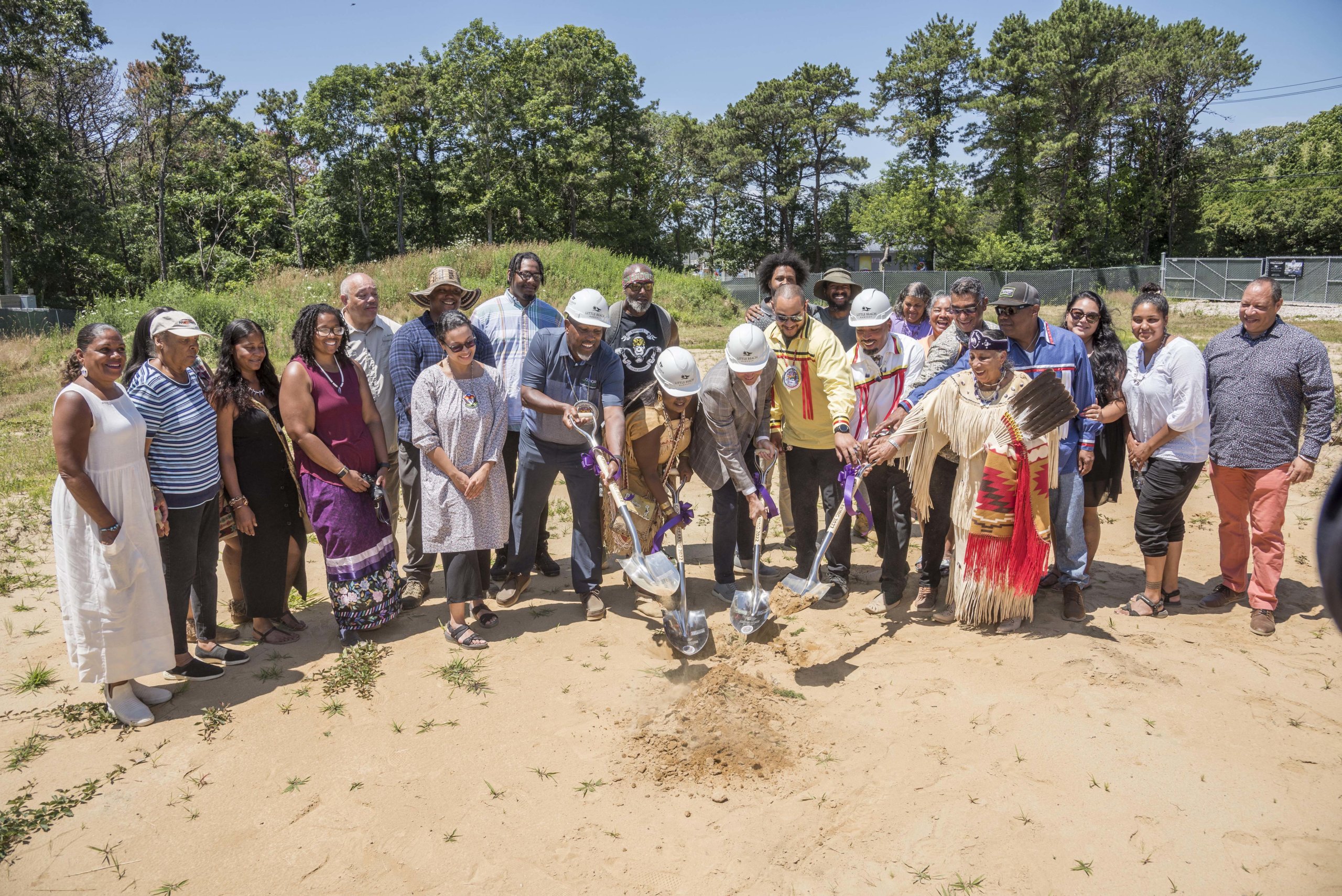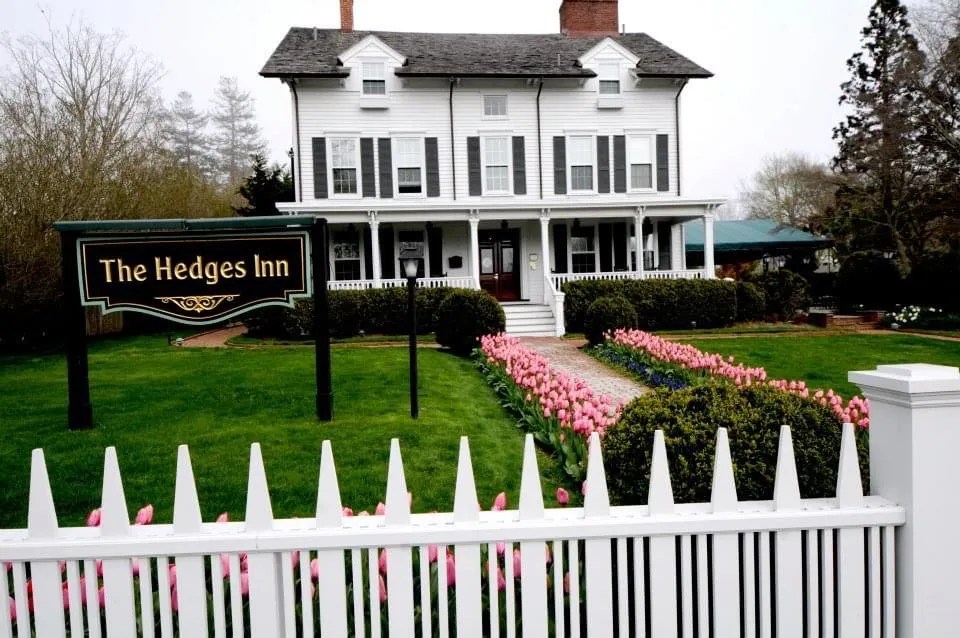Shinnecock Spring: Tribe Reasserts Beach Rights Amid Building Boom, Powwow Revival

Two days after members of the Shinnecok Indian Nation marched on Coopers Beach on a sunny Saturday afternoon to demand free access to their ancestral lands, tribal leaders led a groundbreaking ceremony for a recreational cannabis dispensary.
The back-to-back grassroots protest followed by tribal leaders touting their latest economic development initiative underscored a two-pronged approach the tribe is using to re-stake its land claims while working to secure a financial plan for its future. The renewed push comes as the tribe plans to welcome the public back for its annual Shinnecock Indian Powwow — an event that draws an estimated 30,000 — this Labor Day weekend following a two-year pause due to the coronavirus pandemic.
“It’s long overdue,” Bryan Polite, who chairs the Shinnecock council of trustees, tells Dan’s Papers.
The efforts come at a time when the tribe, which won long-sought federal recognition in 2010 — joining nearly 600 tribes nationwide — is also working to build a casino on its territory, as well as a hotel, gas station and convenience store on land that it owns, chafing neighbors in traffic-choked surrounding communities that boast some of the priciest real estate in the country.
It also recently saw a sacred burial ground known as Sugar Loaf Hill purchased from a private owner and converted to a preserve to prevent development that would desecrate ancient unmarked graves, which is not uncommon in the Hamptons.
While the hotel is in the early planning stages and the casino has experienced setbacks due to the pandemic, the gas station could break ground as soon as this fall. Once the tribe gets the necessary approvals, the gas station will likely prove as successful as gas stations on Long Island’s only other Indian territory, the Poospatuck Reservation in Mastic that is home to the Unkechaug tribe.
That’s because the tribes don’t charge sales tax, so they can charge less, which tends to draw lines at Poospatuck amid current soaring gas prices.
The latest efforts to regain ground and advance new projects are the latest signs the Shinnecock is following through on its plans.
SHINNECOCK BEACH BATTLE
Coopers Beach in the Village of Southampton annually ranks among the top beaches in the nation, but members of the Shinnecock argue that local leaders should grant them free beach passes, as is done elsewhere in the nation.
In making their case to the village, the advocates noted that governments in Rhode Island and Maine granted free beach access to tribal members in those states. The activists added that the Shinnecock shouldn’t be forced to pay fees because the tribe never relinquished the rights to use the oceans and beaches.
“It strikes a common thread with members,” Polite said, noting that grassroots organizers — not tribal leaders — rallied the protesters, who have made similar demands in the past to no avail.
Polite said he’s in talks with Southampton Village Mayor Jesse Warren, but no agreement has been reached.
“Before the rally, we were working on creative solutions on the issue and believe that we can come up with a solution,” Warren told Dan’s Papers. “We have also reached out to the county to request access to Shinnecock East Park.”
Polite remained cautiously optimistic in his beach diplomacy.
“There is a gulf between us, but there is some middle ground,” the tribal chairman said, noting that he didn’t want to undermine the negotiations by speaking too candidly.
The protesters leading the march, of course, had no problem practicing civil disobedience by walking right onto the beach at noon on Saturday, July 9, picketing with signs that said “No More Million Dollar Beach Club” and “Inequality Kills,” among other messages, as Hamptonites sunbathed in the sand.
The protesters rallied up and down Meadow Lane with allies from the advocacy group New York Communities for Change, some of whom were arrested in four days of protests across the Hamptons demanding higher taxes on the rich.

SHINNECOCK POT PROCEEDS
With the same gusto that the grassroots group sought to regain a foothold on ground taken centuries ago, the tribe also eyes newly legalized recreational marijuana as an economic opportunity to bring a new revenue stream into the territory.
Officials gathered for a formal groundbreaking ceremony on Monday, July 11, to mark the start of construction on Little Beach Harvest, a planned 5,000-square-foot adult-use cannabis dispensary — the first of its kind being built on Long Island.
“Anything we envision as a Shinnecock people has to always be for the next seven generations and beyond,” said Chenae Bullock, a Shinnecock member and managing director of Little Beach Harvest.
“The Little Beach Harvest dispensary will be a place where we can share with the world our culture, honor this sacred plant, increase awareness and provide resources for the Shinnecock Nation. People who come to our traditional lands to shop in our dispensary will contribute to our economic sustainability. For thousands of years, the people of the Shinnecock Nation have contributed to environmental sustainability, and we are now in times that we can develop economic sustainability through the cannabis industry to continue our stewardship to the earth.”
Little Beach is being built at 56 Montauk Highway in partnership with Boston-based cannabis consultant group TILT Holdings Inc. and economic development firm Conor Green. They hope to open the dispensary in early 2023.
To date, the state Cannabis Control Board has only licensed conditional cultivator licenses for legal weed farms — a few of which are on the East End — but has yet to officially license any retailers.
SHINNECOCK POWWOW WELCOME
Before the dispensary opens and maybe before the tribal beach passes arrive, the Shinnecock have one old initiative that’s new again.
Like most mass gatherings, the onset of COVID-19 forced the Shinnecock to close its annual powwow, which normally draws thousands of people from beyond its territory. Instead, in 2020 it held an “internal healing ceremony,” Polite said at the time. Last summer, the tribe still wasn’t ready for the crowds to return, but Polite said he is now looking forward to returning the powwow to its prior glory.
The Shinnecock Powwow is one of the largest Native American gatherings on the East Coast and offers a rare glimpse for non-tribal members to celebrate tribal culture.
“We’re really excited about that,” Polite said. “It’s going to be a big deal. We’re hoping that everyone who missed our powwow can join us!”



